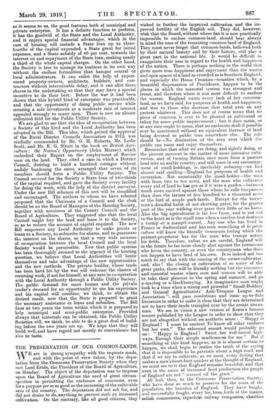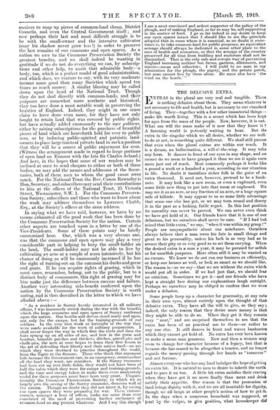THE PRESERVATION 01? OUR COMMON-UNDS.
WE are in strong sympathy with the requests made, and with the point of view taken, by the depu- tation from the Commons Preservation Society when they met Lord Ernle, the President of the Board of Agriculture, on Monday. The object of the deputation was to impress upon the Board of Agriculture the need of great circum- spection in permitting the enclosure of commons, even for a purpose per se so good as the increasing of the cultivable area of the country. The deputation did not ask for, and did not desire to do, anything to prevent such an increased cultivation. On the contrary, like all good citizens, they
wished to further the improved cultivation and the im- proved fertility of the English soil. They did, however, wish that the Board, without whose fiat it is now practically impossible to enclose common-land, should bear always in mind the uses of the remaining common-land of England. They must never forget that common-lands, hallowed both by their natural beauty and by their history, still play a great part in the national life. It would be difficult to exaggerate their uses in regard to the health and happiness of the nation. There is perhaps nothing in the world that gives more true happiness and enjoyment than the wastes and open spaces of a land so crowded as is Southern England, and especially the Home Counties—counties which, by a bountiful dispensation of Providence, happen to be the places in which the manorial system was strongest and freest, and therefore where it was most difficult to enclose the wastes. England wants every inch of her common- land, as we have said, for purposes of health and happiness, and woe to those who decrease that total area on any pretext whatever. This does not of course mean that no piece of common is ever to be planted or cultivated or taken for some public improvement ; but it does mean, or at any rate ought to mean, that no enclosure shall if possible ever be sanctioned without an equivalent increase of land being devoted to public uses somewhere else. The rule should be—No diminution of the area over which the public can roam and enjoy themselves.
Remember that what we are doing, and rightly doing, at the present moment in the matter of more intensive culti- vation, and of turning Britain once more from a pasture land into an arable country, and still more in our encourage- ment of small-holdings, is inevitably reducing—we had almost said spoiling—England for purposes of health and recreation. Not unnaturally the small-holder—the man with from two to ten acres, and the man who cultivates every rod of land he has got as if it were a garden—becomes much more excited against those whom he calla trespassers than does the farmer of five hundred to a thousand acres or the lord of ample park-lands. Except for the towns- man's dreadful habit of not shutting gates, for the greater part of the year walking over grass does little or no harm. Also the big agriculturist is far less fussy, and is not cut to the heart as is the small man when a careless foot destroys a turnip or a mangel-wurzel. Any one who has lived in France or Switzerland and has seen something of /a pc/nee culture will know the literally venomous feeling which the peasant-proprietor has for the man who tramps across his fields. Therefore, unless we are careful, England will in the future be far more closely shut against the townsman who loves the country, or even the countryman who does not happen to have land of his own. It is indeed not too much to say that with the coming of the owner-cultivator, and, alas! the closing or cultivation of so many of the great parks, there will be literally nothing but the COM111011s and manorial wastes where men and women will be able to take their pleasure in the spring and summer, and go a-maying or a-blackberrying. An imaginative man might look to a time when a strong and powerful " Small-Holders' and General Agriculturists' Anti-Trespass League and Association ". will pass resolutions and issue up-to-date literature in order to make it clear that they are determined not to have their lands trampled over by the errant towns- man. We see in vision a new version of Keats's famous sonnet published by the League in order to show that they are not altogether without an aesthetic sense : " Happy is England l I must be content To know all other verdures but her own." The reformed sonnet would probably go on : " Happy is England l Sweet her well-tarred high- ways, Enough their simple mudlessneas for me." But if something of this kind happens, as it is almost certain to happen, we shall begin to realize the truth of the saying that it is impossible to be patriotic about a high road, and that if we are to cultivate, as we must, every feeling that makes a man's heart beat quicker at the thought of England, we must see to it that England remains beautiful, and that even in the name of increased food production the people of England are not " warned off thegrass."
All hail, then, to the Commons Preservation Society, who have done so much to preserve for the mass of the
population the beauties of England. They have fought, and successfully fought. every foe, from lords of the manor, selfish commoners, rapacious railway companies, charities anxious to snap up pieces of common-land cheap, District Councils, and even the Central Government itself ; and now perhaps their last and most difficult struggle is to be with the small-owner and the intensive cultivator (may his shadow never grow less !) in order to preserve the last remains of our commons and open spaces. As a nation we owe to the Commons Preservation Society the greatest benefits, and we shall indeed be wanting in gratitude if we do not do everything we can, by subscrip- tions and other help, to assist that admirable body—a body, too, which is a perfect model of good administration, and which does, we venture to say, with its very moderate income more good than many Societies which spend ten times as much money. A similar blessing may be called down upon the head of the National Trust. Though they do not deal directly with common-lands, and their purposes are somewhat more aesthetic and historical, they too have done a most notable work in preserving the beauties of England. Indeed, they might in one sense claim to have done even more, for they have not only fought to retain land that was covered by public rights, but have actually added enormously to the aver publicus, either by raising subscriptions for the purchase of beautiful pieces of land which are henceforth held for ever to public uses, or by inducing public-spirited and patriotic land- owners to place large tracts of private laud in such a position that they will be a source of public enjoyment for ever. (Witness the arrangement made in regard to large portions of open land on Exmoor with the late Sir Charles Arland.) And here, in the hopes that some of our readers may be inclined at once to send cheques to either or both of these bodies, we may add the names and addresses of the Secre- taries, both of them men to whom the good cause owes much. For the National Trust the Rev. Canon Rawnsley is Hon. Secretary, and subscribers may send their contributions to him at the offices of the National Trust, 25 Victoria Street, Westminster, S.W. 1. For the Commons Preserva- tion Society, subscribers and those who want to know about the work may address themselves to Lawrence Chubb, Esq., at the Society's offices at the same address.
In saying what we have said, however, we have by no means exhausted all the good work that has been done by the Commons Preservation Society for the nation. Certain other aspects are touched upon in a letter by one of the Vice-Presidents. Some of these points may be briefly summarized here. One, which was a very obvous one, was that the commons and open spaces may play a very considerable part in helping to keep the small-holder on the land, The small-holder may not be able to live by cultivating an acre or a couple of acres intensively, but his chance of doing so will be enormously increased if he has the right of turning out on the common his ducks and geese and goats. If he can acquire rights of grazing, which in most cases, remember, belong, not to the public, but to a distinct body of commoners, this right of grazing may for him make just the difference between success and failure. Another very interesting side-benefit conferred upon the nation by the Commons Preservation Society is worth noting, sod is thus described in the letter to which we have alluded above :— " As a resident in Surrey keenly interested in all military affaina; I was immensely struck during the war with the benefits which the large commons and open spaces of Surrey conferred upon the nation. Our heaths and downs stood ready and open, not only for the camps, but for the training-grounds of our soldiers. In the very first week or fortnight of the war they were made available for the work of military preparation. I shall never forget the way in which first the tents and then the huts sprang up on all sides of me, and how in the gorse and heather, bramble patches and thickets, ditches, gravel-pits and chalk-pits, the men at once began to learn their first leseon in She art of defending their liberty and their native land—an art which they were destined to practise throughout the world, from the Tigris to the Somme. Those who thank this argument fails because the Government can, in an emergency, commandeer all the land they want, are mistaken. If the Surrey commons had been cut up into little fields, they would not have been of half the value which they wore for camps and training-grounds, and the time and energy taken to make them even moderately useful for these purposes must have been very great. Unques- tionably the Commons Preservation Society, to which wo so largely owe the saving of the Surrey commons, deserves well of the nation. Though no doubt they did not know it, by saving our open spaces they were preparing for war. These circum- stances, amongst a host of others, make inn more than over convinced of the need of provehting further enclosures of common-laud on any pretext whatever. And I say this though I am a Most convinced and ardent supporter of the policy of the plough, and of making England, as far as may he, self-supporting in the matter of food. I go so far indeed in my desire to keep our open spaces intact that I should like to see the principle adopted that in eases where it is essential, as no doubt it some- times is, to take common-land for public purposes, an equivalent acreage should always be dedicated ha some other place to the uses of health and recreation, so that the acreage of the country preserved for all time from building and enclosure shall not be diminished. That is the only safe and certain way of preventing England becoming nothing but farms, gardens, allotments, and streets—mean and othern-isa. I will yield to no man in my admiration for the plough, the pigsty, and the potato patch, but man cannot live by these alone. He must also have the wind on the heath.' "



































 Previous page
Previous page